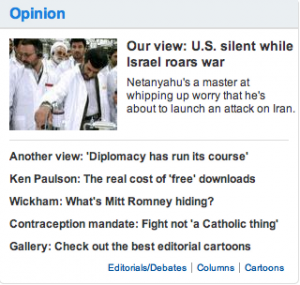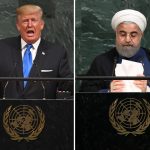 This is USA Today’s editorial board suggesting that Prime Minister Benjamin Netanyahu’s Iran-attack media campaign is likely just more of the same Israeli tactic to pressure the United States into implementing harsher measures against Iran’s nuclear program:
This is USA Today’s editorial board suggesting that Prime Minister Benjamin Netanyahu’s Iran-attack media campaign is likely just more of the same Israeli tactic to pressure the United States into implementing harsher measures against Iran’s nuclear program:
Say this for Israeli Prime Minister Benjamin Netanyahu: He’s a master at whipping up worry that he’s about to launch an attack on Iran. He’s been doing it for years, extracting American support in the process.
So perhaps what’s happening in Israel today is just more Netanyahu stagecraft, timed to the U.S. presidential campaign. If so, it’s an Oscar-worthy performance. By all appearances, Netanyahu is preparing his nation for war.
More directly:
The leading theory for Netanyahu’s timing — speculative but logical — is that he sees the American political campaign as a moment of maximum leverage. President Obama, fearing the loss of Jewish votes in a close election, will feel compelled either to back an Israeli attack or to deter the Israelis by making new, more specific commitments to a U.S. attack later.
The pity is that the analysis is probably right, because the United States so far seems incapable of conducting the kind of debate Israel is having.
After noting the heated debate within Israel about the pros and cons of attacking Iran, the board concludes that a vigorous debate also needs to take place in the US before it “risks launching itself into another military morass”:
The decisions could not be more fateful. No American would be immune from the impact of an attack on Iran. That’s why the time for a vigorous debate — not just in Israel but in the USA, too — is before the bombs fly.
And this is Clifford D. May, president of the hawkish Washington think tank, the Foundation for Defense of Democracies, disagreeing with the board, firstly by declaring that US intelligence and International Atomic Energy Association assessments about Iran’s nuclear program are wrong with a single statement: “Iran’s rulers have been developing nuclear weapons” and that “should no longer be a matter of debate.” Secondly, by referencing belligerent Iranian rhetoric against Israel as “reasons” why the Israelis are “very much justified in using military force”, and thirdly, by invoking the horrors of the Holocaust and WWII while pushing a top Iran hawk talking point, that time is running out:
But if the Israelis know where the centrifuge factories are, and if they are confident they can destroy or seriously degrade them, that course of action deserves serious consideration. Diplomacy has run its course. Sanctions have damaged Iran’s economy but do not appear to have weakened the will of the theocratic regime.
Winston Churchill called World War II an unnecessary war because it could have been prevented: The Nazis should never have been allowed to obtain the weapons they would use to overrun Europe. Hitler marveled to one of his generals that no one challenged him while he was weak. They waited until he was at his strongest, thus guaranteeing a much bloodier conflict.
That mistake should not be made again — never again, as we used to say.
Readers are left to decide who has the more reasonable, rational, sound argument in this debate.





